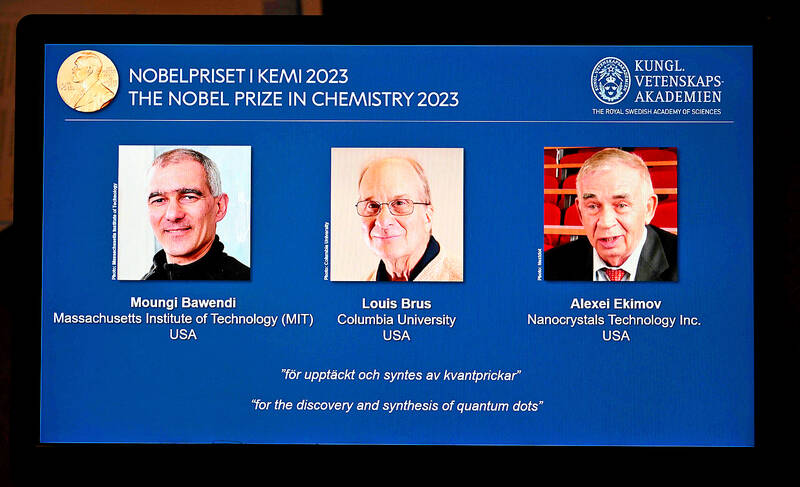Three scientists won the Nobel Prize in chemistry on Wednesday for their work on quantum dots — tiny particles that can release very bright colored light and are used in electronics and medical imaging.
Moungi Bawendi of MIT. Louis Brus of Columbia University and Alexei Ekimov of Nanocrystals Technology Inc were honored for their work with the particles just a few atoms in diameter and that “have unique properties and now spread their light from television screens and LED lamps,” according to the Royal Swedish Academy of Sciences, which announced the award in Stockholm.
“They catalyze chemical reactions and their clear light can illuminate tumor tissue for a surgeon,” the academy said.

Photo: AFP
Quantum dots’ electrons have constrained movement, and this affects how they absorb and release visible light, allowing for very bright colors.
In a highly unusual leak, Swedish media reported the names of the winners before the prize was announced.
“There was a press release sent out for still unknown reasons. We have been very active this morning to find out exactly what happened,” academy secretary-general Hans Ellegren told the news conference where the award was announced. “This is very unfortunate, we do regret what happened.”
The academy, which awards the physics, chemistry and economics prizes, asks for nominations a year in advance from thousands of university professors and other academics around the world.
A committee for each prize then discusses candidates in a series of meetings throughout the year. At the end of the process, the committee presents one or more proposals to the full academy for a vote.
The deliberations, including the names of nominees other than the winners, are kept confidential for 50 years.
Ekimov, 78, and Brus, 80, are early pioneers of the technology, while Bawendi, 62, is credited with revolutionizing the production of quantum dots “resulting in almost perfect particles. This high quality was necessary for them to be utilized in applications,” the academy said.
Bawendi told the news conference that he was “very surprised, sleepy, shocked, unexpected and very honored.”
“The community realized the implications in the mid 90s, that there could potentially be some real world applications,” Bawendi said.
Asked about the leak, he said he did not know about the prize until he was called by the academy.
On Tuesday, the physics prize went to French-Swedish physicist Anne L’Huillier, French scientist Pierre Agostini and Hungarian-born Ferenc Krausz for producing the first split-second glimpse into the superfast world of spinning electrons.
On Monday, Hungarian-American Katalin Kariko and American Drew Weissman won the Nobel Prize in medicine for discoveries that enabled the creation of mRNA vaccines against COVID-19.
The chemistry prize means Nobel season has reached its halfway stage. The prizes in literature, peace and economics follow, with one announcement every weekday until Monday.
The Nobel Foundation raised the prize money by 10 percent this year to 11 million kronor (US$996,100).
In addition to the money, winners receive an 18-carat gold medal and diploma when they collect their Nobel Prizes at the award ceremonies in December.

A magnitude 7.0 earthquake struck off Yilan at 11:05pm yesterday, the Central Weather Administration (CWA) said. The epicenter was located at sea, about 32.3km east of Yilan County Hall, at a depth of 72.8km, CWA data showed There were no immediate reports of damage. The intensity of the quake, which gauges the actual effect of a seismic event, measured 4 in Yilan County area on Taiwan’s seven-tier intensity scale, the data showed. It measured 4 in other parts of eastern, northern and central Taiwan as well as Tainan, and 3 in Kaohsiung and Pingtung County, and 2 in Lienchiang and Penghu counties and 1

FOREIGN INTERFERENCE: Beijing would likely intensify public opinion warfare in next year’s local elections to prevent Lai from getting re-elected, the ‘Yomiuri Shimbun’ said Internal documents from a Chinese artificial intelligence (AI) company indicated that China has been using the technology to intervene in foreign elections, including propaganda targeting Taiwan’s local elections next year and presidential elections in 2028, a Japanese newspaper reported yesterday. The Institute of National Security of Vanderbilt University obtained nearly 400 pages of documents from GoLaxy, a company with ties to the Chinese government, and found evidence that it had apparently deployed sophisticated, AI-driven propaganda campaigns in Hong Kong and Taiwan to shape public opinion, the Yomiuri Shimbun reported. GoLaxy provides insights, situation analysis and public opinion-shaping technology by conducting network surveillance

‘POLITICAL GAME’: DPP lawmakers said the motion would not meet the legislative threshold needed, and accused the KMT and the TPP of trivializing the Constitution The Legislative Yuan yesterday approved a motion to initiate impeachment proceedings against President William Lai (賴清德), saying he had undermined Taiwan’s constitutional order and democracy. The motion was approved 61-50 by lawmakers from the main opposition Chinese Nationalist Party (KMT) and the smaller Taiwan People’s Party (TPP), who together hold a legislative majority. Under the motion, a roll call vote for impeachment would be held on May 19 next year, after various hearings are held and Lai is given the chance to defend himself. The move came after Lai on Monday last week did not promulgate an amendment passed by the legislature that

Taiwan is gearing up to celebrate the New Year at events across the country, headlined by the annual countdown and Taipei 101 fireworks display at midnight. Many of the events are to be livesteamed online. See below for lineups and links: Taipei Taipei’s New Year’s Party 2026 is to begin at 7pm and run until 1am, with the theme “Sailing to the Future.” South Korean girl group KARA is headlining the concert at Taipei City Hall Plaza, with additional performances by Amber An (安心亞), Nick Chou (周湯豪), hip-hop trio Nine One One (玖壹壹), Bii (畢書盡), girl group Genblue (幻藍小熊) and more. The festivities are to